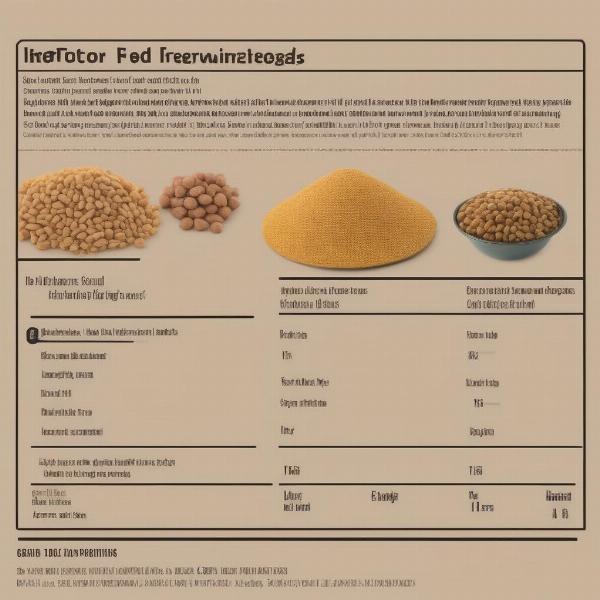No cereal dog food, also known as grain-free dog food, has become increasingly popular among pet owners. But is it the right choice for your furry friend? This comprehensive guide will delve into the world of no cereal dog food, exploring its benefits, potential drawbacks, and what to look for when choosing the best grain-free diet for your dog.
Understanding the Grain-Free Trend
Many pet owners opt for no cereal dog food due to concerns about allergies, digestive sensitivities, and the belief that a grain-free diet is more natural for dogs. While some dogs genuinely benefit from a grain-free diet, it’s important to remember that grains themselves aren’t inherently bad. In fact, they can be a valuable source of essential nutrients. The key is to choose high-quality grains and ensure they are appropriately processed.
Benefits of No Cereal Dog Food
For some dogs, a no cereal diet can offer several advantages. Dogs with grain allergies or sensitivities often experience improved digestion, reduced skin irritation, and a shinier coat. Grain-free diets can also lead to increased energy levels and better weight management in some dogs. “A carefully selected grain-free diet can be transformative for dogs with specific dietary needs,” says Dr. Emily Carter, DVM, a veterinary nutritionist. “It’s crucial to consult with your veterinarian to determine if it’s the right option for your individual dog.”
Potential Drawbacks of Grain-Free Diets
While no cereal dog food can be beneficial for certain dogs, it’s not without potential drawbacks. Some grain-free formulas rely heavily on potatoes or legumes as carbohydrate sources, which can contribute to weight gain if not carefully monitored. There have also been some concerns about a potential link between grain-free diets and dilated cardiomyopathy (DCM) in dogs, although more research is needed to fully understand this connection. “It’s essential to choose a high-quality grain-free food from a reputable brand and monitor your dog’s health closely,” advises Dr. Carter.
Choosing the Right No Cereal Dog Food
When selecting a no cereal dog food, look for formulas that prioritize high-quality animal protein sources, such as meat or fish. Check the ingredient list carefully and avoid foods with artificial colors, flavors, and preservatives. Consider your dog’s individual needs, such as age, breed, activity level, and any underlying health conditions. Consulting with your veterinarian can help you determine the best grain-free option for your dog.
Transitioning to a No Cereal Diet
If you decide to switch your dog to a no cereal diet, it’s important to do so gradually. Start by mixing a small amount of the new food with your dog’s current food, gradually increasing the proportion of the new food over several days. This will help prevent digestive upset and allow your dog to adjust to the new diet.
 Comparing Dog Food Labels
Comparing Dog Food Labels
Conclusion
No cereal dog food can be a healthy and beneficial choice for some dogs, particularly those with grain allergies or sensitivities. However, it’s important to carefully consider the potential drawbacks and choose a high-quality formula that meets your dog’s individual needs. Always consult with your veterinarian before making any significant changes to your dog’s diet. By doing your research and working with your vet, you can make informed decisions to ensure your furry friend receives the best possible nutrition.
FAQ
- Is no cereal dog food better than food with grains? Not necessarily. It depends on your dog’s individual needs and sensitivities.
- Can puppies eat no cereal dog food? Yes, there are grain-free puppy formulas available, but consult your vet first.
- Are all grain-free dog foods the same? No, the quality and ingredients vary significantly between brands.
- What are the signs of a grain allergy in dogs? Common signs include itchy skin, digestive upset, and ear infections.
- How do I know if my dog needs a grain-free diet? Consult with your veterinarian to determine if a grain-free diet is appropriate for your dog.
- Can switching to no cereal dog food cure my dog’s allergies? It can help manage symptoms if the allergies are grain-related.
- Is no cereal dog food more expensive? Grain-free formulas can be more expensive than traditional dog food.
Related Articles
ILM Dog is a leading online resource for dog owners worldwide. We offer expert advice on dog breeds, health, training, nutrition, grooming, and much more. From puppy care to senior dog care, ILM Dog provides practical tips and insights to help you provide the best possible care for your canine companion. Contact us today via email at [email protected] or by phone at +44 20-3965-8624 to learn more about our services and resources.